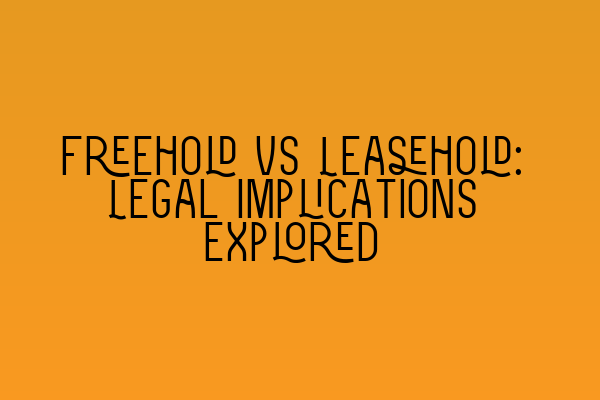Freehold vs Leasehold: Legal Implications Explored
When it comes to property ownership, two common terms you may come across are freehold and leasehold. These terms refer to the different legal arrangements under which properties are held. Understanding the legal implications of freehold and leasehold ownership is crucial, especially if you are planning to buy or sell property. In this article, we will explore the key differences between freehold and leasehold, examine the legal rights and responsibilities associated with each, and provide valuable insights into making informed decisions regarding property ownership.
The Basics: What is Freehold?
Freehold is the highest form of property ownership. When you own a property on a freehold basis, you have complete ownership and control over both the building and the land it stands on. As a freeholder, you are the outright owner of the property for an indefinite period of time. Freehold properties are typically houses, bungalows, or other structures built on individual plots of land. Being a freeholder grants you the right to use, modify, sell, or transfer your property as you see fit, subject to local planning and zoning regulations.
Freehold ownership comes with several advantages. Firstly, you are not bound by any leasehold restrictions, such as ground rent or service charges. Secondly, you have the freedom to make alterations or improvements to your property without seeking permission from any third party. Moreover, as a freeholder, you have the potential to benefit from any increase in the property’s value over time.
Understanding Leasehold Ownership
On the other hand, leasehold ownership is a form of property ownership where the property is leased to the owner for a specific period of time. In a leasehold arrangement, you are essentially buying the right to use and occupy the property for a set number of years, typically ranging from 99 to 999 years. However, you do not own the land upon which the property is built. The land and building are owned by a separate entity called the freeholder, who grants you the lease.
While leasehold ownership is common in the context of flats or apartments, it can also apply to houses in certain cases. Leasehold properties often come with certain obligations and restrictions. For instance, as a leaseholder, you may be required to pay ground rent and service charges to the freeholder for the maintenance and upkeep of communal areas. The lease agreement may also include covenants that restrict what you can do with the property, such as obtaining consent for alterations or subletting.
It’s important to review the terms of the lease carefully before purchasing a leasehold property to ensure that you understand your rights and responsibilities as a leaseholder. Additionally, it is advisable to engage the services of a property solicitor who specializes in leasehold transactions to guide you through the legal implications.
Legal Implications of Freehold and Leasehold
Both freehold and leasehold ownership come with their own set of legal implications.
With freehold ownership, you have complete control over the property. You can make changes to the property, sell it, or transfer it to someone else without needing permission from anyone else. However, as a freeholder, you also bear complete responsibility for the maintenance and repair of the property and the land it occupies.
Leasehold ownership, on the other hand, is subject to the terms and conditions outlined in the lease agreement. While you may have the right to occupy and use the property, you may need to seek permission from the freeholder for certain actions, such as making structural changes or subletting. Additionally, leasehold properties are often subject to ground rent and service charges, which can increase over time.
Understanding the legal implications of freehold and leasehold ownership is crucial when buying or selling property. It is essential to carefully review all documents, including the lease agreement and any relevant contracts or agreements, and seek legal advice to ensure you are fully aware of your rights and obligations.
Making Informed Decisions
When considering whether to purchase a freehold or leasehold property, it is important to weigh the benefits and drawbacks of each type of ownership.
Freehold ownership provides you with autonomy and the ability to make decisions about your property without seeking permission from anyone else. It also eliminates potential costs associated with ground rent and service charges. However, freehold properties may be more expensive upfront, and you will be solely responsible for all maintenance and repairs.
Leasehold ownership, on the other hand, may offer a more affordable option for purchasing a property. In addition, the responsibility for maintenance and repairs may be shared with other leaseholders, particularly in the case of flats or apartments. However, leasehold ownership comes with certain restrictions and ongoing financial obligations.
When making a decision between freehold and leasehold ownership, consider your long-term plans, financial situation, and preferences. It is advisable to consult with a property solicitor who can provide you with expert advice tailored to your specific circumstances.
In conclusion, freehold and leasehold ownership represent different legal arrangements with distinct rights and responsibilities. Understanding the legal implications of these types of ownership is crucial when buying or selling property. By carefully reviewing all relevant documents and seeking professional advice, you can make informed decisions that align with your goals and protect your interests.
Related Articles:
- 48. Unlocking Legal Research Skills for SQE Success
- 53. Functioning Legal Knowledge (FLK): Core Concepts for SQE Candidates
- 44. Essential SQE Textbooks: Building a Solid Foundation for Exam Prep
- 43. Unraveling the SQE Stages: A Roadmap to Success
- 41. Test Centers for SQE: Convenient Locations for the Exam
